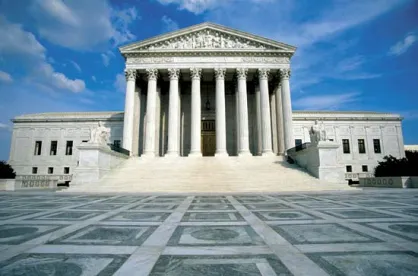The Supreme Court granted certiorari in Encino Motorcars, LLC v. Navarro, No. 15-415 (June 20, 2016), to resolve a circuit court split regarding whether “service advisors” are exempt from receiving overtime pay under the Fair Labor Standards Act (FLSA). Although the parties thoroughly briefed the issue, the Court did not resolve the question. Instead, as Justice Clarence Thomas noted in his dissent, the Court decided to “punt” (likely due to an inability to garner a majority opinion because of the vacancy at the Court caused by Justice Antonin Scalia’s death that has left it with just eight members since February). Automobile dealers are likely to face uncertainty a while longer.
To resolve the case, the Court identified a separate error by the U.S. Court of Appeals for the Ninth Circuit (San Francisco) on which all of the Justices could agree: the Ninth Circuit held service advisors were entitled to overtime by deferring to a 2011 Department of Labor regulation. But that regulation was issued without any reasoned explanation for the change. Under those circumstances, the Supreme Court held, the regulation was arbitrary and capricious and entitled to no deference. Having identified that error, the Court then remanded the case to the Ninth Circuit to determine, in the first instance (without deference to the DOL regulation), whether the exemption applied.
Significantly, the failure to resolve whether “service advisors” are exempt resulted in a decision that addresses a much broader issue: the level of deference that should be given to agency positions that vacillate over time. Encino Motorcars thus reaches beyond the particular FLSA exemption at issue in the case.
Factual Background
Plaintiffs were “service advisors” who worked at a Los Angeles-area automobile dealership and who alleged they were denied overtime under the FLSA. Service advisors typically meet with customers, listen to their concerns about their cars, suggest repairs and maintenance services, and sell services for the vehicles.
The dealership, relying on an overtime exemption for “salesman, partsmen, and mechanics” who are primarily engaged in “selling or servicing automobiles” under the FLSA (see 29 U.S.C. 213(b)(10)(A)), moved to dismiss the complaint. The motion was granted by the district court, but reversed by the Ninth Circuit. Critically, in holding the service advisors were entitled to overtime, the Ninth Circuit deferred to a 2011 Department of Labor regulation stating the exemption did not apply to service advisors
DOL’s Changing Positions
The 213(b)(10)(A) exemption at issue, also known as the “automobile dealer exemption,” was enacted in 1966. Shortly thereafter, in 1970, the DOL issued a regulation stating service advisers were not covered by the exemption, and, therefore, eligible for overtime pay. But several courts soon disagreed, including the Fifth Circuit in 1971. As a result, in 1978, the DOL abandoned the 1970 regulation in an opinion letter, stating its position was that service advisors are covered by the exemption, and, therefore, not eligible for overtime pay. DOL also amended its Field Operations Handbook in 1987 to reflect this position and stated the regulations would be updated as soon as practicable. But that did not occur until 2008, more than 20 years later, when the DOL, under the Bush Administration, issued proposed regulations codifying that service advisors are exempt. The proposed regulations themselves took several years to be finalized. A final rule was not issued until 2011, after the Obama Administration had taken the reins. Instead of moving forward with the proposed regulation, the agency did an about-face, stating DOL would take the contrary position: service advisors are not covered by the exemption and thus are eligible for overtime pay. The final rule, however, offered little explanation for the change in position. Despite this, the Ninth Circuit deferred to the agency when the issue came before it.
No Deference is Due to 2011 Regulation
The Supreme Court held the Ninth Circuit erred in deferring to the 2011 regulation.
The Court explained that under Chevron U.S.A. Inc. v. Natural Resources Defense Council, Inc., 467 U.S. 837 (1984), if a statute is ambiguous and Congress has delegated to an agency the power to resolve those ambiguities, a court must defer to the agency’s interpretation if it is “reasonable.” But, the Court explained, no deference is warranted where the regulation is procedurally defective (i.e., the agency does not follow the correct procedures in issuing the regulation) or the agency does not give “adequate reasons” for its decisions. “Agencies are free to change their existing policies,” the Court held, “as long as they provide a reasoned explanation for the change.” Here, the Court found the DOL did not provide a reasoned explanation.
The Court was highly critical of the DOL’s flip-flop, noting the DOL “offered barely any explanation” and, when explaining the reasons, “said almost nothing.” The Court recognized the DOL indicated it found persuasive the comments it received regarding the exclusion of service advisors from the exemption. But the Court held this was insufficient because “the Department did not explain what (if anything) it found persuasive in those comments.” That the industry had relied on the agency’s position since 1978 also supported the Court’s holding that the DOL’s conclusory statements were particularly insufficient.
Clues to the Merits
While the majority did not address the merits of the question presented, Justice Thomas, in dissent, addressed it head-on. Justice Thomas agreed that the DOL’s 2011 regulation was entitled to no deference, but argued the Court need not wade into the question of deference because the text is clear that service advisors are covered by the exemption.
Justice Ruth Bader Ginsberg, joined by Justice Sonia Sotomayor, concurred, agreeing the 2011 regulation is entitled to no deference, but disagreed with Justice Thomas that the language of the statute clearly resolves the case in favor of the employer. They agreed that the Ninth Circuit should address it in the first instance.
The question of whether service advisors are exempt, which arose almost immediately after the passage of the exemption in 1966, remains unresolved 50 years later. It is likely that the losing side in the Ninth Circuit will seek a decision from the Supreme Court. With a full bench, the question may be resolved (unless Congress steps in before then).
Sub-Plot: End of the Narrow Construction Principle?
In reaching its decision, the Ninth Circuit also quoted the oft-repeated line that courts must “narrowly construe” FLSA exemptions because it is a remedial statute. Justice Thomas and Justice Samuel Alito also took aim at this canon of construction, instructing the Ninth Circuit “not to do so again on remand,” calling it a “made up canon” and noting the Court has declined to apply that canon in two recent FLSA cases.
“There is no basis to infer that Congress means anything beyond what a statute plainly says simply because the legislation in question could be classified as ‘remedial,’” they explained (referring to a law review article by Justice Antonin Scalia and an amicus brief by the U.S. Chamber of Commerce). The case, therefore, may provide further guidance and authority for courts interpreting FLSA exemptions and may signal the end of this “made up” canon.




 />i
/>i


